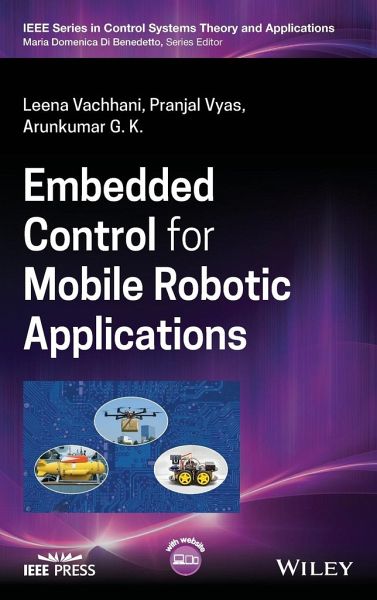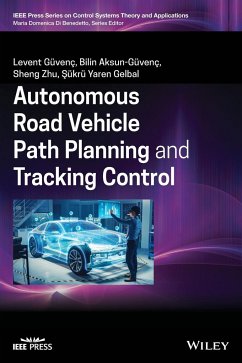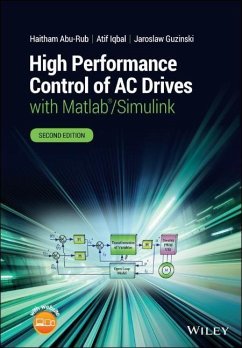
Embedded Control for Mobile Robotic Applications
Versandkostenfrei!
Versandfertig in über 4 Wochen
114,99 €
inkl. MwSt.
Weitere Ausgaben:

PAYBACK Punkte
57 °P sammeln!
An all-in-one resource for designing and implementing embedded control in mobile roboticsIn Embedded Control for Mobile Robotic Applications, a distinguished trio of researchers delivers an authoritative and fulsome resource for understanding embedded control and robotics. The book includes coverage of a variety of embedded platforms, their use in controller implementation, stability analyses of designed controllers, and two new approaches for designing embedded controllers.The authors offer a full chapter on Field-Programmable-Gate-Array (FPGA) architecture development for controller design t...
An all-in-one resource for designing and implementing embedded control in mobile robotics
In Embedded Control for Mobile Robotic Applications, a distinguished trio of researchers delivers an authoritative and fulsome resource for understanding embedded control and robotics. The book includes coverage of a variety of embedded platforms, their use in controller implementation, stability analyses of designed controllers, and two new approaches for designing embedded controllers.
The authors offer a full chapter on Field-Programmable-Gate-Array (FPGA) architecture development for controller design that is perfect for both practitioners and students taking robotics courses and provide a companion website that includes MATLAB codes for simulation and embedded platform-specific code for mobile robotic applications (in Embedded C and Verilog).
The two approaches discussed by the authors--the top-down methodology and the bottom-up methodology--are of immediate practical utility to both practicing professionals in the field and students studying control applications and mobile robotics. The book also offers:
_ A thorough introduction to embedded control, including processor, IC, and design technology, as well as a discussion of limitations in embedded control design
_ Comprehensive explorations of the bottom-up and top-down methods, including computations using CORDIC, interval arithmetic, sliding surface design, and switched nonlinear systems
_ Practical discussions of generic FPGA architecture design, including Verilog, PID controllers, DC motors and Encoder, and a systematic approach for designing architecture using FSMD
_ In-depth examinations of discrete-time controller design, including the approximation to discrete-time transfer function and embedded implementation stability
Perfect for practitioners working in embedded control design and control applications in robotics, Embedded Control for Mobile Robotic Applications will also earn a place in the libraries of academicians, researchers, senior undergraduate students, and graduate students in these fields.
In Embedded Control for Mobile Robotic Applications, a distinguished trio of researchers delivers an authoritative and fulsome resource for understanding embedded control and robotics. The book includes coverage of a variety of embedded platforms, their use in controller implementation, stability analyses of designed controllers, and two new approaches for designing embedded controllers.
The authors offer a full chapter on Field-Programmable-Gate-Array (FPGA) architecture development for controller design that is perfect for both practitioners and students taking robotics courses and provide a companion website that includes MATLAB codes for simulation and embedded platform-specific code for mobile robotic applications (in Embedded C and Verilog).
The two approaches discussed by the authors--the top-down methodology and the bottom-up methodology--are of immediate practical utility to both practicing professionals in the field and students studying control applications and mobile robotics. The book also offers:
_ A thorough introduction to embedded control, including processor, IC, and design technology, as well as a discussion of limitations in embedded control design
_ Comprehensive explorations of the bottom-up and top-down methods, including computations using CORDIC, interval arithmetic, sliding surface design, and switched nonlinear systems
_ Practical discussions of generic FPGA architecture design, including Verilog, PID controllers, DC motors and Encoder, and a systematic approach for designing architecture using FSMD
_ In-depth examinations of discrete-time controller design, including the approximation to discrete-time transfer function and embedded implementation stability
Perfect for practitioners working in embedded control design and control applications in robotics, Embedded Control for Mobile Robotic Applications will also earn a place in the libraries of academicians, researchers, senior undergraduate students, and graduate students in these fields.














